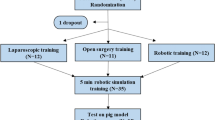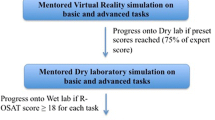Abstract
Background
Robotic surgery is a valid option for minimally invasive surgery in most surgical specialties. However, the need to master laparoscopy is questionable before starting specific training in robotic surgery. We compared the development of basic robotic surgery skills between individuals randomized to train in conventional, laparoscopic, or robotic skills.
Methods
We conducted a single-centered, single-blinded randomized trial. Medical students were randomly assigned to 20 h of conventional, laparoscopic, or robotic surgical training. Students with previous surgical experience were excluded. Participants were evaluated pre- and post-training on the dV-Trainer robotic surgical simulator with the following exercises: Camera Targeting 1, Peg Board 1, Ring and Rail 1, and Ring and Rail 2.
Results
Sixty-six students were randomly assigned to each training group. Eight individuals did not complete the study (2 in the conventional group, 3 in the laparoscopic group, and 3 in the robotic group). All groups demonstrated significant improvement in the composite score and in each task following the training period (p < 0.001). No differences were seen between the conventional and laparoscopic groups in the composite score or individual tasks. The robotic group showed greater improvement in number of errors, economy of motion, workspace utilization, and time for completion compared to the other groups. The laparoscopic group showed improved camera manipulation skills compared to the conventional group, while the conventional group showed improved errors and economy of motion compared to the laparoscopic group.
Conclusion
There was no difference in the acquisition of basic robotic surgical skills between individuals trained in basic conventional or laparoscopic surgical skills. We believe surgeons mastery in laparoscopy is not needed before initiating robotic surgical training. However, basic principles of laparoscopy remain applicable to robotic surgery. Future studies should compare transferability of conventional and laparoscopic training to robotic skills in the operating room.




Similar content being viewed by others
References
Buchs NC, Addeo P, Bianco FM, Gorodner V, Ayloo SM, Elli EF, Oberholzer J, Benedetti E, Giulianotti PC (2012) Perioperative risk assessment in robotic general surgery: lessons learned from 884 cases at a single institution. Arch Surg-Chicago 147:701–708. https://doi.org/10.1001/archsurg.2012.496
Giulianotti PC, Addeo P, Buchs NC, Ayloo SM, Bianco FM (2011) Robotic extended pancreatectomy with vascular resection for locally advanced pancreatic tumors. Pancreas 40:1264–1270. https://doi.org/10.1097/mpa.0b013e318220e3a4
Giulianotti PC, Coratti A, Sbrana F, Addeo P, Bianco FM, Buchs NC, Annechiarico M, Benedetti E (2011) Robotic liver surgery: results for 70 resections. Surgery 149:29–39. https://doi.org/10.1016/j.surg.2010.04.002
Buchs NC, Addeo P, Bianco FM, Ayloo S, Benedetti E, Giulianotti PC (2011) Robotic versus open pancreaticoduodenectomy: a comparative study at a single institution. World J Surg 35:2739–2746. https://doi.org/10.1007/s00268-011-1276-3
Trinh Q-D, Sammon J, Sun M, Ravi P, Ghani KR, Bianchi M, Jeong W, Shariat SF, Hansen J, Schmitges J, Jeldres C, Rogers CG, Peabody JO, Montorsi F, Menon M, Karakiewicz PI (2012) Perioperative outcomes of robot-assisted radical prostatectomy compared with open radical prostatectomy: results from the nationwide inpatient sample. Eur Urol 61:679–685. https://doi.org/10.1016/j.eururo.2011.12.027
Baek J-H, Pastor C, Pigazzi A (2011) Robotic and laparoscopic total mesorectal excision for rectal cancer: a case-matched study. Surg Endosc 25:521–525. https://doi.org/10.1007/s00464-010-1204-x
Vibert E, Denet C, Gayet B (2003) Major digestive surgery using a remote-controlled robot: the next revolution. Arch Surg-Chicago 138:1002–1006. https://doi.org/10.1001/archsurg.138.9.1002
Han C, Yan P, Jing W, Li M, Du B, Si M, Yang J, Yang K, Cai H, Guo T (2020) Clinical, pathological, and oncologic outcomes of robotic-assisted versus laparoscopic proctectomy for rectal cancer: a meta-analysis of randomized controlled studies. Asian J Surg 43:880–890. https://doi.org/10.1016/j.asjsur.2019.11.003
Jenison EL, Gil KM, Lendvay TS, Guy MS (2012) Robotic surgical skills: acquisition, maintenance, and degradation. Jsls J Soc Laparoendosc Surg 16:218–228. https://doi.org/10.4293/108680812x13427982376185
Pimentel M, Cabral RD, Costa MM, Neto BS, Cavazzola LT (2018) Does previous laparoscopic experience influence basic robotic surgical skills? J Surg Educ 75:1075–1081. https://doi.org/10.1016/j.jsurg.2017.11.005
Teishima J, Hattori M, Inoue S, Ikeda K, Hieda K, Miyamoto K, Shoji K, Hayashi T, Kobayashi K, Kajiwara M, Egi H, Ohdan H, Matsubara A (2012) Impact of laparoscopic experience on the proficiency gain of urologic surgeons in robot-assisted surgery. J Endourol 26:1635–1638. https://doi.org/10.1089/end.2012.0308
Rocco B, Matei D, Melegari S, Ospina JC, Mazzoleni F, Errico G, Mastropasqua M, Santoro L, Detti S, Cobelli OD (2009) Robotic vs open prostatectomy in a laparoscopically naive centre: a matched-pair analysis. BJU Int 104:991–995. https://doi.org/10.1111/j.1464-410x.2009.08532.x
Chandra V, Nehra D, Parent R, Woo R, Reyes R, Hernandez-Boussard T, Dutta S (2010) A comparison of laparoscopic and robotic assisted suturing performance by experts and novices. Surgery 147:830–839. https://doi.org/10.1016/j.surg.2009.11.002
Zihni A, Gerull WD, Cavallo JA, Ge T, Ray S, Chiu J, Brunt LM, Awad MM (2018) Comparison of precision and speed in laparoscopic and robot-assisted surgical task performance. J Surg Res 223:29–33. https://doi.org/10.1016/j.jss.2017.07.037
Kilic GS, Walsh TM, Borahay M, Zeybek B, Wen M, Breitkopf D (2012) Effect of residents’ previous laparoscopic surgery experience on initial robotic suturing experience. ISRN Obstet Gynecol 2012:569456. https://doi.org/10.5402/2012/569456
Angell J, Gomez MS, Baig MM, Abaza R (2013) Contribution of laparoscopic training to robotic proficiency. J Endourol 27:1027–1031. https://doi.org/10.1089/end.2013.0082
Wolanski P, Chabert C, Jones L, Mullavey T, Walsh S, Gianduzzo T (2012) Preliminary results of robot-assisted laparoscopic radical prostatectomy (RALP) after fellowship training and experience in laparoscopic radical prostatectomy (LRP). BJU Int 110:64–70. https://doi.org/10.1111/j.1464-410x.2012.11479.x
Ploussard G, Xylinas E, Salomon L, Vordos D, Hoznek A, Abbou C, Taille ADL (2010) Robot-assisted extraperitoneal laparoscopic radical prostatectomy: experience in a high-volume laparoscopy reference centre. BJU Int 105:1155–1160. https://doi.org/10.1111/j.1464-410x.2009.09013.x
Schulz KF, Altman DG, Moher D, Group F the C (2011) CONSORT 2010 statement: updated guidelines for reporting parallel group randomised trials. Int J Surg 9:672–677. https://doi.org/10.1016/j.ijsu.2011.09.004
Tabuenca A, Welling R, Sachdeva AK, Blair PG, Horvath K, Tarpley J, Savino JA, Gray R, Gulley J, Arnold T, Wolfe K, Risucci DA (2007) Multi-institutional validation of a web-based core competency assessment system. J Surg Educ 64:390–394. https://doi.org/10.1016/j.jsurg.2007.06.011
Vassiliou MC, Dunkin BJ, Marks JM, Fried GM (2010) FLS and FES: comprehensive models of training and assessment. Surg Clin N Am 90:535–558. https://doi.org/10.1016/j.suc.2010.02.012
Orlando MS, Thomaier L, Abernethy MG, Chen CCG (2017) Retention of laparoscopic and robotic skills among medical students: a randomized controlled trial. Surg Endosc 31:3306–3312. https://doi.org/10.1007/s00464-016-5363-2
Davila DG, Helm MC, Frelich MJ, Gould JC, Goldblatt MI (2018) Robotic skills can be aided by laparoscopic training. Surg Endosc 32:2683–2688. https://doi.org/10.1007/s00464-017-5963-5
Lerner MA, Ayalew M, Peine WJ, Sundaram CP (2010) Does training on a virtual reality robotic simulator improve performance on the da Vinci® surgical system? J Endourol 24:467–472. https://doi.org/10.1089/end.2009.0190
van Dongen KW, Ahlberg G, Bonavina L, Carter FJ, Grantcharov TP, Hyltander A, Schijven MP, Stefani A, van der Zee DC, Broeders IAMJ (2011) European consensus on a competency-based virtual reality training program for basic endoscopic surgical psychomotor skills. Surg Endosc 25:166–171. https://doi.org/10.1007/s00464-010-1151-6
Thijssen AS, Schijven MP (2010) Contemporary virtual reality laparoscopy simulators: quicksand or solid grounds for assessing surgical trainees? Am J Surg 199:529–541. https://doi.org/10.1016/j.amjsurg.2009.04.015
Lyons C, Goldfarb D, Jones SL, Badhiwala N, Miles B, Link R, Dunkin BJ (2013) Which skills really matter? Proving face, content, and construct validity for a commercial robotic simulator. Surg Endosc 27:2020–2030. https://doi.org/10.1007/s00464-012-2704-7
Murphy DG, Sundaram CP (2013) Comparative assessment of three standardized robotic surgery training methods. BJU Int 112:713–714. https://doi.org/10.1111/j.1464-410x.2012.11760.x
Abboudi H, Khan MS, Aboumarzouk O, Guru KA, Challacombe B, Dasgupta P, Ahmed K (2013) Current status of validation for robotic surgery simulators—a systematic review. BJU Int 111:194–205. https://doi.org/10.1111/j.1464-410x.2012.11270.x
Korets R, Mues AC, Graversen JA, Gupta M, Benson MC, Cooper KL, Landman J, Badani KK (2011) Validating the use of the mimic dV-trainer for robotic surgery skill acquisition among urology residents. Urology 78:1326–1330. https://doi.org/10.1016/j.urology.2011.07.1426
Finnegan KT, Meraney AM, Staff I, Shichman SJ (2012) da Vinci skills simulator construct validation study: correlation of prior robotic experience with overall score and time score simulator performance. Urology 80:330–336. https://doi.org/10.1016/j.urology.2012.02.059
Hung AJ, Zehnder P, Patil MB, Cai J, Ng CK, Aron M, Gill IS, Desai MM (2011) Face, content and construct validity of a novel robotic surgery simulator. J Urol 186:1019–1025. https://doi.org/10.1016/j.juro.2011.04.064
Azadi S, Green IC, Arnold A, Truong M, Potts J, Martino MA (2021) Robotic surgery: the impact of simulation and other innovative platforms on performance and training. J Minim Invasive Gynecol 28:490–495. https://doi.org/10.1016/j.jmig.2020.12.001
Ghezzi TL, Luca F, Valvo M, Corleta OC, Zuccaro M, Cenciarelli S, Biffi R (2014) Robotic versus open total mesorectal excision for rectal cancer: comparative study of short and long-term outcomes. Eur J Surg Oncol (EJSO) 40:1072–1079. https://doi.org/10.1016/j.ejso.2014.02.235
Perrenot C, Perez M, Tran N, Jehl J-P, Felblinger J, Bresler L, Hubert J (2012) The virtual reality simulator dV-Trainer® is a valid assessment tool for robotic surgical skills. Surg Endosc 26:2587–2593. https://doi.org/10.1007/s00464-012-2237-0
Loftus TJ, Filiberto AC, Upchurch GR, Hall DJ, Mira JC, Taylor J, Shaw CM, Tan SA, Sarosi GA (2021) Performance improvement with implementation of a surgical skills curriculum. J Surg Educ 78:561–569. https://doi.org/10.1016/j.jsurg.2020.08.030
Schmidt MW, Köppinger KF, Fan C, Kowalewski K-F, Schmidt LP, Vey J, Proctor T, Probst P, Bintintan VV, Müller-Stich B-P, Nickel F (2021) Virtual reality simulation in robot-assisted surgery: meta-analysis of skill transfer and predictability of skill. BJS Open. https://doi.org/10.1093/bjsopen/zraa066
Traynor MD, Owino J, Rivera M, Parker RK, White RE, Steffes BC, Chikoya L, Matsumoto JM, Moir CR (2021) Surgical simulation in east, central, and Southern Africa: a multinational survey. J Surg Educ. https://doi.org/10.1016/j.jsurg.2021.01.005
Acknowledgements
We would like to thank the participants who volunteered for this study. We would like to also thank the Hospital de Clínicas de Porto Alegre for allowing us to use the dV-Trainer robotic surgical simulator and the Surgical Skills Laboratory in this study. Finally, we would like to thank the Instituto Simutec for allowing us to use their facilities to perform the laparoscopic training sessions.
Funding
The authors have not disclosed any funding.
Author information
Authors and Affiliations
Corresponding author
Ethics declarations
Disclosures
Drs. Roberto Vanin Pinto Ribeiro, João Maximiliano, Guilherme Barreiro, Olavo Haas de Souza Gastal, Pauline Simas Machado, Luciano Paludo Marcelino, Henrique Rasia Bosi, Eduardo Madalosso Zanin, and Leandro Totti Cavazzola have no relevant disclosures related to this study.
Additional information
Publisher's Note
Springer Nature remains neutral with regard to jurisdictional claims in published maps and institutional affiliations.
Rights and permissions
About this article
Cite this article
Ribeiro, R.V.P., Maximiliano, J., Barreiro, G. et al. Acquisition of robotic surgical skills does not require laparoscopic training: a randomized controlled trial. Surg Endosc 36, 7325–7333 (2022). https://doi.org/10.1007/s00464-022-09118-9
Received:
Accepted:
Published:
Issue Date:
DOI: https://doi.org/10.1007/s00464-022-09118-9




